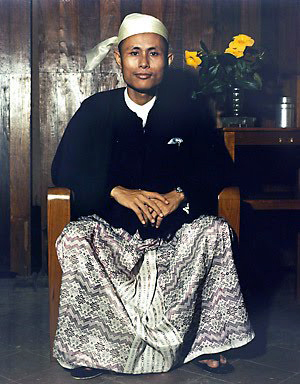
Aung San was a Burmese politician, independence activist and revolutionary. He was instrumental in Myanmar's struggle for independence from British rule, but he was assassinated just six months before his goal was realized. Aung San is considered the founder of modern-day Myanmar and the Tatmadaw, and is commonly referred to by the titles "Father of the Nation", "Father of Independence", and "Father of the Tatmadaw".

Ba Maw was a Burmese lawyer and political leader, active during the interwar period and Second World War. He was the first Burma Premier (1937–1939) and head of State of Burma from 1942 to 1945.

The Anti-Fascist People's Freedom League (AFPFL) was the dominant political alliance in Burma from 1945 to 1958. It consisted of political parties and mass and class organizations.

The Burma Independence Army (BIA) was a pro-Japanese and revolutionary army that fought for the end of British rule in Burma by assisting the Japanese in their conquest of the country in 1942 during World War II. It was the first post-colonial army in Burmese history. The BIA was formed from a group known as the Thirty Comrades under the auspices of the Imperial Japanese Army after training the Burmese nationalists in 1941. The BIA's attempts at establishing a government during the invasion led to it being dissolved by the Japanese and the smaller Burma Defence Army (BDA) formed in its place. As Japan guided Burma towards nominal independence, the BDA was expanded into the Burma National Army (BNA) of the State of Burma, a puppet state under Ba Maw, in 1943.
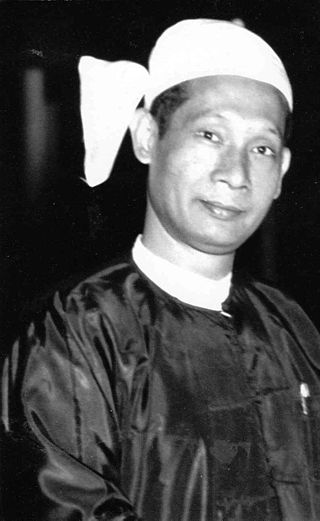
Ba Swe was the second Prime Minister of Burma. He was a leading Burmese politician during the decade after the country gained its independence from Britain in 1948. He held the position of prime minister from 12 June 1956 to 28 February 1957. When Ba Swe became prime minister, Time magazine reported the news in an article titled: 'The Day of the Tiger' based on his nickname 'Big Tiger' since his university days in the 1930s as a student leader.

The Thirty Comrades constituted the embryo of the modern Burmese army called the Burma Independence Army (BIA) which was formed to fight for independence from Britain. This was accomplished just before the majority of the Thirty Comrades returned with the invading Japanese Army initially through Southern Burma in December 1941.

Thakin Than Tun was a Burmese politician and leader of the Communist Party of Burma (CPB) from 1945 until his assassination in 1968. He was the brother-in-law of Myanmar's independence leader Aung San and the uncle of the former State Counsellor of Myanmar Aung San Suu Kyi.
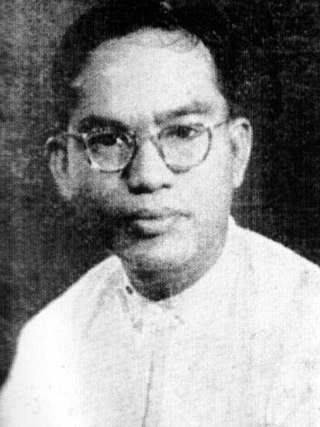
Thein Pe Myint was a Burmese politician, writer, and journalist. He wrote several politically and socially prominent books and founded the influential newspaper, The Botataung. Thein Pe Myint was a leading Marxist intellectual and an important player in the Burmese independence movement and postwar politics.
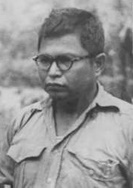
Thakin Soe was a founding member of the Communist Party of Burma, formed in 1939 and a leader of Anti-Fascist Organisation. He is regarded as one of Burma's most prominent communist leaders.

The Japanese occupation of Burma was the period between 1942 and 1945 during World War II, when Burma was occupied by the Empire of Japan. The Japanese had assisted formation of the Burma Independence Army, and trained the Thirty Comrades, who were the founders of the modern Armed Forces (Tatmadaw). The Burmese hoped to gain support of the Japanese in expelling the British, so that Burma could become independent.

The Anti-Fascist Organisation (AFO) was a resistance movement against the Japanese occupation of Burma and independence of Burma during World War II. It was the forerunner of the Anti-Fascist People's Freedom League.

Dobama Asiayone, commonly known as the Thakhins, was a Burmese nationalist group formed around the 1930s and composed of young, disgruntled intellectuals. Drawing their name from the way in which the British were addressed during colonial times, the party was established by Ba Thaung in May 1930, bringing together traditionalist Buddhist nationalist elements and fresh political ideals. It was significant in stirring up political consciousness in Burma, and drew most of its support base from students.
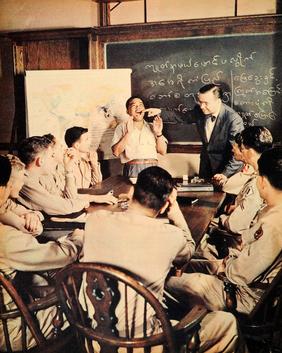
William Stewart Cornyn (1906–1971) was a Canadian-born American linguist and author, noted for his expertise in Burmese and Russian language studies, as well as for his research on Athabaskan and Burman etymology.

General elections were held in Burma on 9 April 1947 to form the basis of a constituent assembly that would design a constitution once independence from the United Kingdom had been achieved. They were the first elections in Burma since its separation from India under the British Raj. Voter turnout was 49.8%. However, Aung San was assassinated three months later, resulting in U Nu becoming the first Prime Minister of Burma.
Thakin Kyaw Tun, or Thakin Kyaw Dun was a Burmese politician.

Kyaw Nyein, called honorifically U Kyaw Nyein, was a Burmese lawyer and anti-colonial revolutionary, a leader in Burma’s struggle for independence and prominent politician in the first decade after the country gained sovereignty from Britain. He held multiple minister portfolios in the government of Prime Minister U Nu, served as General Secretary of the ruling political alliance, Anti-Fascist People's Freedom League (AFPFL), and was joint General Secretary of the Burma Socialist Party (BSP).

The Poor Man's Party was a political party in Burma led by Ba Maw.

The Burma Democratic Party was a political party in Burma.
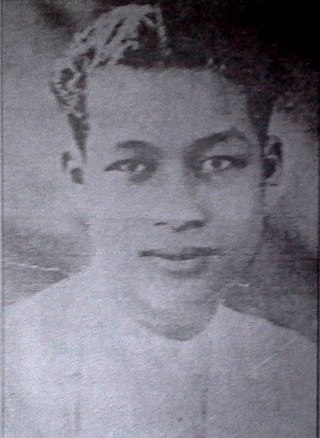
Thakin Ba Hein was one of the founding members of the Communist Party of Burma, formed in 1939. He was considered the father of "true communism" in Burma by the Communist Party of Burma (CPB).
Khin Ma Ma Maw, also known as Consort Maw, was the first nanyinwun kadaw of British Burma, as the wife of Premier Ba Maw. Ba Maw being inaugurated as the Naingandaw Adhipati of the State of Burma, Maw served as the first lady of the State of Burma from 17 May 1942 to 27 March 1945.















